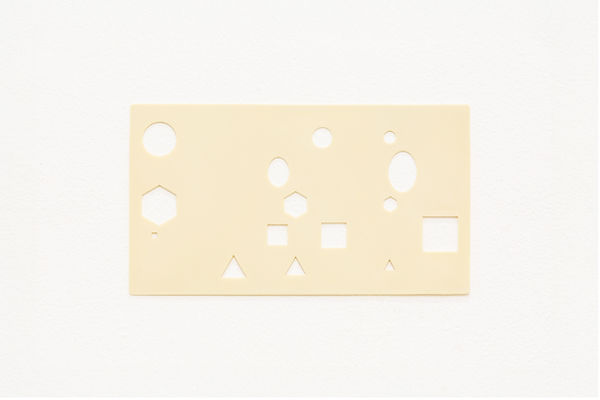© 2020 by Mami Chihara Proudly created with Wix.com
「トレース何か」 ーSee Saw GALLERY+hibit
Trace something- See Saw gallery + hibit

風景T(3d) #3,#4,#5,#2
PLA樹脂
120×215×1mm
2024
Landscape T(3d) #3,#4,#5,#2
PLA Resin
120×215×1mm
2024

風景T(3d) #6
PLA樹脂
120×215×4mm
2024
Landscape T(3d) #6
PLA Resin
120×215×4mm
2024

風景T(pa) #6,#1,#8
紙、シャープペンシル
170×250mm,170×250mm,250×352mm
2024
Landscape T(pa) #6,#1,#8
Paper,Pencil
170×250mm,170×250mm,250×352mm
2024
撮影:城戸保
Photo : Tamotsu Kido

風景T(3d) #2
PLA樹脂
120×215×1mm
2024
Landscape T(3d) #2
PLA Resin
120×215×1mm
2024

風景T(3d) #4
PLA樹脂
120×215×1mm
2024
Landscape T(3d) #4
PLA Resin
120×215×1mm
2024

風景T(3d) #5
PLA樹脂
120×215×1mm
2024
Landscape T(3d) #5
PLA Resin
120×215×1mm
2024

風景T(3d) #6
PLA樹脂
120×215×4mm
2024
Landscape T(3d) #6
PLA Resin
120×215×4mm
2024

風景T(3d) #7
PLA樹脂
120×215×1mm
2024
Landscape T(3d) #7
PLA Resin
120×215×1mm
2024

風景T(pa) #1
紙、シャープペンシル
170×250mm
2024
Landscape T(pa) #1
Paper,Pencil
170×250mm
2024

風景T(pa) #2
紙、シャープペンシル
250×352mm
2024
Landscape T(pa) #2
Paper,Pencil
250×352mm
2024

風景T(pa) #6
紙、シャープペンシル
170×250mm
2024
Landscape T(pa) #6
Paper,Pencil
170×250mm
2024

風景T(pa) #8
紙、シャープペンシル
250×352mm
2024
Landscape T(pa) #8
Paper,Pencil
250×352mm
2024
撮影:相川啓太
Photo : Keita Aikawa
千原真実は「風景」をテーマに、いわゆる「絵を描く」という言葉で想起されるようなやり方とは異なるアプローチで多様な絵画「的」作品を生み出しています。千原が「風景」という語を用いる際に、私たちが一般的に想起する自然景観や都市風景のようなものを指していないことに留意する必要があります。日常的に目にしている物体を組み合わ せや加工によって変容させ、なにか別のものに見える可能性が発生した瞬間をつかまえること、その気配を持つ状態になったものを彼女は「風景」として捉えているのです。 本展で発表する《風景T(3d)》シリーズは、製図用テンプレート定規をモチーフとしています。様々な大きさの円形や多角形がくり抜かれたプラスチック製の定規を用いて紙に線 を引き、そのなかの形態を取捨選択することによって、一つの定規から様々なパターンの「風景」を導き出していきます。それを元に3D プリンタを用いて、もとの定規を想起させ る厚みや質感をもたせています。 また、同じようにテンプレート定規を用いて紙に描いた形象に、陰影にも見えるグラデーションを施し、テンプレート定規の外形が地に、そこに 形態が浮遊しているかのように見えるドローイング作品が《風景 T(pa)》です。《 風景T(3d)》はテンプレート定規そのものを図化し、《風景T(pa)》ではその抜け形を図化し ています。テンプレート定規で形を書くことに特別な技術は必要ではなく、誰にでも可能です。千原はその誰にでもできることの使い方をずらすことによって、絵画的な要素をも つオブジェへと変換します。千原にとっての制作は、絵画の定型を避けつつ日常の中にある定型の異物感に着目し、別の技術を発明することなのです。
-企画:末永史尚
Mami Chihara explores the theme of "landscape" through a unique approach that differs from the conventional notions typically associated with the act of "painting." It is important to note that when Chihara uses the word "landscape," she is not referring to natural scenery or urban views as we commonly imagine. Instead, she captures the moment when familiar, everyday objects are transformed—through combination or manipulation—into something that appears entirely different. It is this state, imbued with the potential to become something else, that she interprets as "landscape."
The Landscape T (3d) series presented in this exhibition draws inspiration from drafting templates. These plastic drawing stencils, perforated with variously sized circles and polygons, are used to draw lines on paper. By selecting and combining specific shapes from a single drawing tool, Chihara generates a variety of patterned "landscapes." Using 3D printing, she then materializes these landscapes into objects, incorporating the thickness and texture reminiscent of the original templates.
Correspondingly, her Landscape T (pa) series consists of drawings made using various types of drafting templates. She applies gradients that resemble shadows or light, creating an effect where the template's outer form serves as a base, while the selected shapes appear to float above it. While Landscape T (3d) visualizes the template itself, Landscape T (pa) renders the negative spaces within it.
Using a drafting template is a simple act that requires no particular skill—it's something anyone can do. Chihara, however, reframes this commonly simple act, shaping it into a creative process that results in objects carrying the essence of painting. For Chihara, the act of creating art involves avoiding conventional painting formulas, focusing instead on the unfamiliar patterns in everyday life, and inventing new techniques in response.
-Curated by: Fuminao Suenaga
